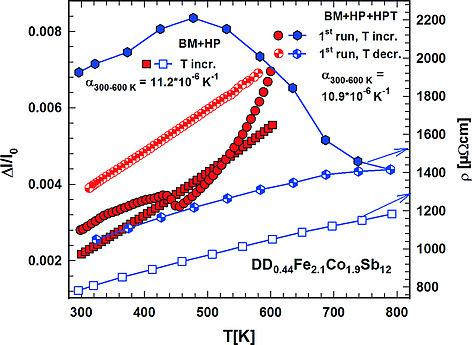当前位置:
X-MOL 学术
›
Z. Anorg. Allg. Chem.
›
论文详情
Our official English website, www.x-mol.net, welcomes your feedback! (Note: you will need to create a separate account there.)
Resistivity and Thermal Expansion (4.2–820 K) of Skutterudites after Severe Plastic Deformation via HPT
Zeitschrift für anorganische und allgemeine Chemie ( IF 1.4 ) Pub Date : 2020-07-16 , DOI: 10.1002/zaac.202000040 Gerda Rogl 1, 2 , Viktor Soprunyuk 3 , Wilfried Schranz 3 , Michael J. Zehetbauer 4 , Jiri Bursik 5 , Herbert Müller 2 , Ernst Bauer 2 , Peter F. Rogl 1
Zeitschrift für anorganische und allgemeine Chemie ( IF 1.4 ) Pub Date : 2020-07-16 , DOI: 10.1002/zaac.202000040 Gerda Rogl 1, 2 , Viktor Soprunyuk 3 , Wilfried Schranz 3 , Michael J. Zehetbauer 4 , Jiri Bursik 5 , Herbert Müller 2 , Ernst Bauer 2 , Peter F. Rogl 1
Affiliation

|
Thermoelectric materials with a high figure of merit, ZT, are the essential basis to build thermoelectric generators, which can directly convert heat into electricity. Severe plastic deformation (SPD) via high‐pressure torsion (HPT) was successfully applied to enhance ZT of ball‐milled and hot‐pressed skutterudites as well as to produce bulk nanostructured skutterudites directly from powders. SPD introduces many defects into the sample and in parallel the crystallite size is significantly reduced. During measurement‐induced heating these defects anneal partially out, and the grains grow. In this work for the first time systematically the changes of the temperature‐dependent electrical resistivity and of thermal expansion were compared. It could be shown that for p‐ and n‐type skutterudites, being hot‐pressed and HPT‐processed as well as directly HPT‐processed from compacted powder, these changes occur more or less simultaneously within the same temperature ranges. This evaluation gives a much deeper insight into the thermoelectric behavior of HPT samples under the influence of changing temperature.
中文翻译:

通过HPT进行严重塑性变形后方钴矿的电阻率和热膨胀(4.2–820 K)
具有高品质因数ZT的热电材料是构建热电发电机的必要基础,该发电机可将热量直接转化为电能。通过高压扭转(HPT)进行的严重塑性变形(SPD)已成功应用于增强球磨和热压方钴矿的ZT以及直接由粉末生产块状纳米结构方钴矿。SPD将许多缺陷引入样品中,与此同时,微晶尺寸也大大减小。在测量引起的加热过程中,这些缺陷会部分退火,晶粒长大。在这项工作中,这是第一次系统地比较了温度依赖性电阻率和热膨胀率的变化。可以证明,对于p型和n型skutterudite,通过热压和HPT加工以及直接从压实粉末进行HPT加工,这些变化或多或少地在相同温度范围内同时发生。该评估可以更深入地了解温度变化影响下的HPT样品的热电行为。
更新日期:2020-07-16
中文翻译:

通过HPT进行严重塑性变形后方钴矿的电阻率和热膨胀(4.2–820 K)
具有高品质因数ZT的热电材料是构建热电发电机的必要基础,该发电机可将热量直接转化为电能。通过高压扭转(HPT)进行的严重塑性变形(SPD)已成功应用于增强球磨和热压方钴矿的ZT以及直接由粉末生产块状纳米结构方钴矿。SPD将许多缺陷引入样品中,与此同时,微晶尺寸也大大减小。在测量引起的加热过程中,这些缺陷会部分退火,晶粒长大。在这项工作中,这是第一次系统地比较了温度依赖性电阻率和热膨胀率的变化。可以证明,对于p型和n型skutterudite,通过热压和HPT加工以及直接从压实粉末进行HPT加工,这些变化或多或少地在相同温度范围内同时发生。该评估可以更深入地了解温度变化影响下的HPT样品的热电行为。



























 京公网安备 11010802027423号
京公网安备 11010802027423号